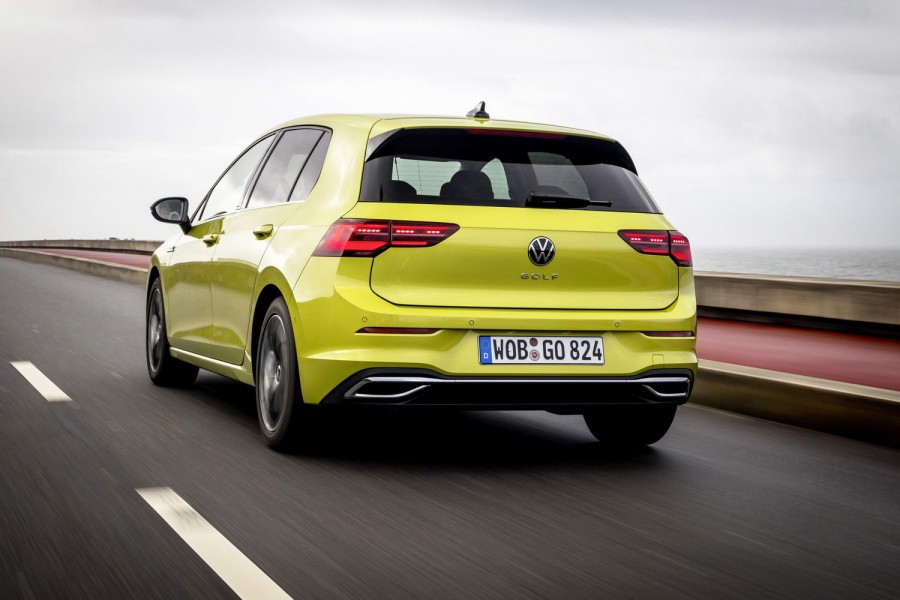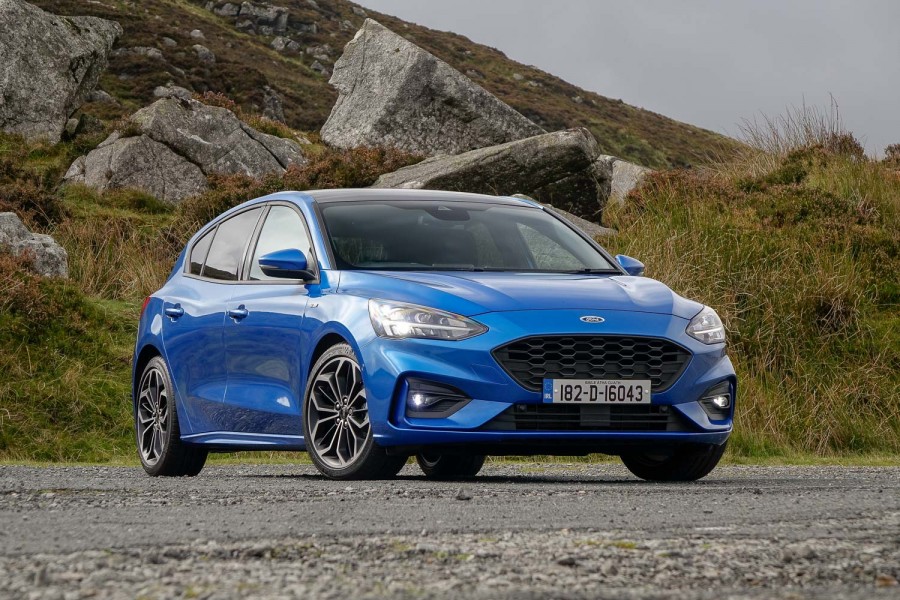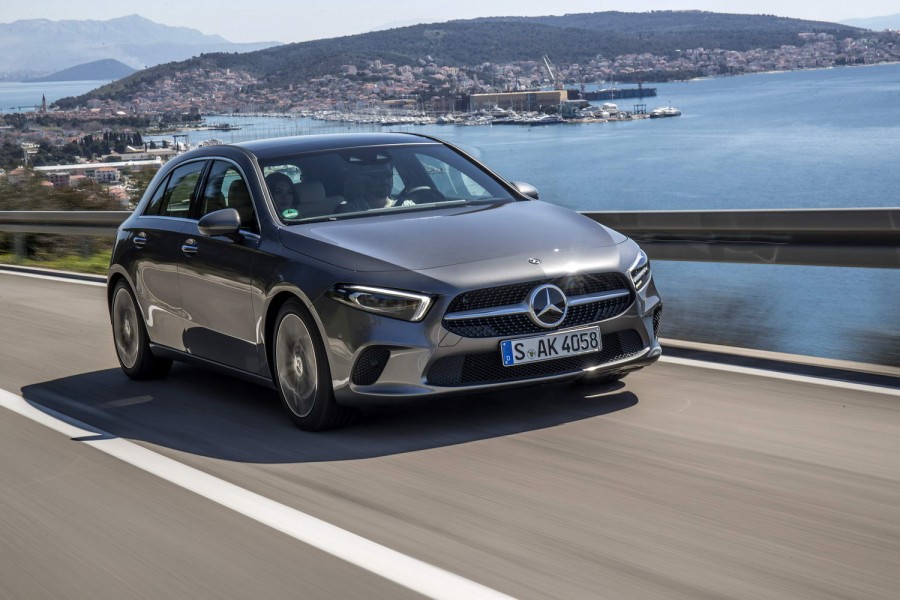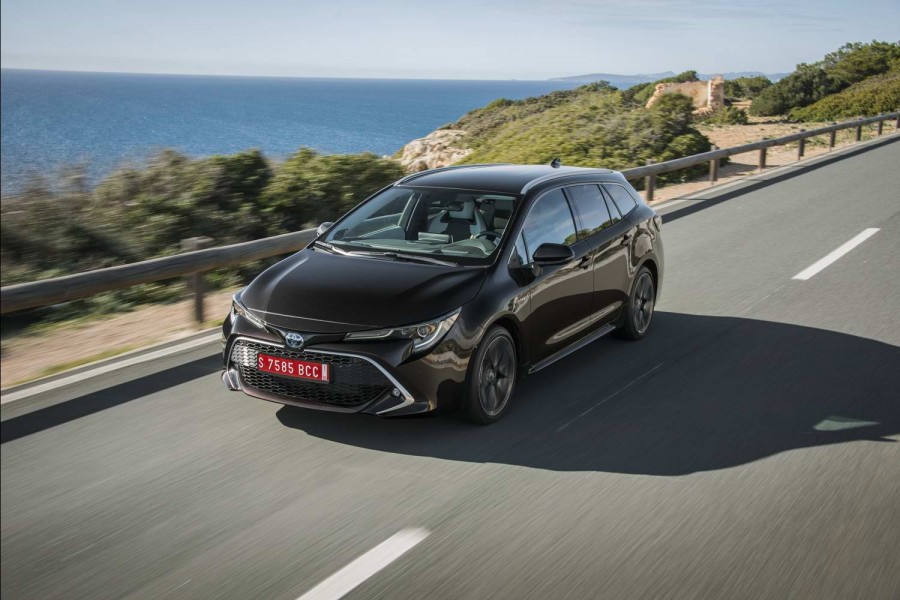Few Irish buyers will plump for this top-spec 150hp diesel version of the 2020 Volkswagen Golf 8, but it is deeply impressive. Ignore diesel power at your peril.
In the metal
Having already mentioned that the new Golf 8 looks very much like the old Golf 7, at least in profile, perhaps it's only fair to note that there are some distinctive touches that separate the two. The headlights are noticeably more rounded and slimmer, as well as set much lower than before. The rear lights (and all of the lighting is now by LED as standard) are also much slimmed-down and shapelier. It is, blindingly obviously, a Golf and very Golf-y in the way it looks, but there is just about enough difference to keep loyal buyers interested, without alienating them.
The cabin is definitely the Golf 8's most successful feature. The almost-conjoined twin digital screens, set up above the dash roll, look great (aside from the awful, cheap-looking black plastic that frames them) while the pod-like layouts for the few physical buttons on show also look good. The steering wheel feels fantastic in your hands, and the seats are among the best of any current family car. All in all (but bearing in mind that this is an almost-top-spec Style model) it feels properly premium inside, up to the standards of more expensive cars such as the Mercedes-Benz A-Class and BMW 1 Series. Indeed, one wonders quite how Audi is going to justify the extra money it will ask for the next-generation A3...
Again, though, the small flick-switch shifter for the DSG dual-clutch automatic gearbox seems like waste of effort - it looks cool but fails to free up much more space on the centre console compared to the manual gearbox option, or indeed the older, chunkier DSG shifter. A case of a nice idea not fully pursued. There's also the question of how well some older Golf buyers will get along with this new digital environment, but I guess if people can learn to use smartphones, they can work their way around this.
Driving it
OK, so very few Irish buyers are going to stump up the extra cash necessary to secure this 150hp version of the 2.0-litre diesel. Most Irish Golf customers will instead buy either the basic 1.0-litre turbo three-cylinder petrol engine, or the lower-tuned 115hp 2.0-litre diesel (there's no 1.6 diesel this time around, a fact that may, more than anything else, push buyers back towards petrol - many people still have a mental block about buying a 2.0-litre engine in a car the size of a Golf, even if the CO2 figures stack up).
The thing is, those who don't will be missing out, as this is definitely the best of the two engines we've sampled in the new Golf. Whereas we struggled to get the new eTSI mild-hybrid 1.5 petrol to deliver decent fuel economy in real-world conditions (our best effort was a 6.8 litres per 100km average), this diesel bangs in a 5.5 litres per 100km performance (better than 50mpg) right off the bat, without even trying.
With 360Nm of torque, it's also a delight to drive on the motorway, eating up miles and gaining extra bursts of speed to get past recalcitrant trucks on long inclines with ease. There is, obviously, a bit of extra weight on the nose compared to the eTSI petrol version, but it doesn't seem to have blunted the handling too much - even in shockingly wet conditions on our test route, the diesel Golf still turned in keenly, and cornered with aplomb. Then again, this version gets the more expensive multi-link rear suspension, so it will be interesting to see how much of a step down a more basic Golf 8, with the simpler, cheaper, torsion bar rear end, will drive.
For those concerned about environmental issues, VW is trying hard to rebuild its diesel image. This new family of TDI engines comes with 'dual injection' AdBlue treatment for the exhaust, which is reckoned to cut emissions of nasty NOx by 80 per cent. Impressive, as long as it works outside the lab. Otherwise, of course, it's worth remembering that diesels are naturally lower in climate-changing CO2 than petrol engines, so you are at least doing your Greta Thunberg best in that regard.
The DSG gearbox seems to be noticeably livelier with this new engine than we've seen in the recent past, too. There's much less hesitancy when pulling out of junctions, and the upshifts and downshifts feel snappier. Let's hope that continues when we get to sample the Golf in right-hand drive.
What you get for your money
We still don't have pricing for the new Golf, but this 2.0-litre TDI in Style spec will be well-past the €30,000 barrier, so it will be interesting to see how it compares with the similarly priced electric Volkswagen ID.3 when that car goes fully on sale in 2021. The good news for the Golf is that standard specs are getting better, and this Style version comes with exterior ambient lighting, three-zone climate control, lane-changing steering, traffic jam assist and 17-inch alloy wheels. It's essentially the top-spec Golf for those who don't want the sportier styling of the R-Line. Most buyers will probably go for a slightly lesser specced Life version, which does in fairness come with digital instruments, adaptive cruise control, park distance control, leather steering wheel, navigation, wireless phone charging, ambient interior lighting and 16-inch alloys.
Summary
As ever, the Volkswagen Golf is hard to fault. OK, so diesel may not be fashionable right now (albeit, we're actually expecting a bounce-back in diesel sales for 2020), but this 2.0 TDI is fluent, flexible and fantastically comfy. A devastatingly good all-rounder.


































